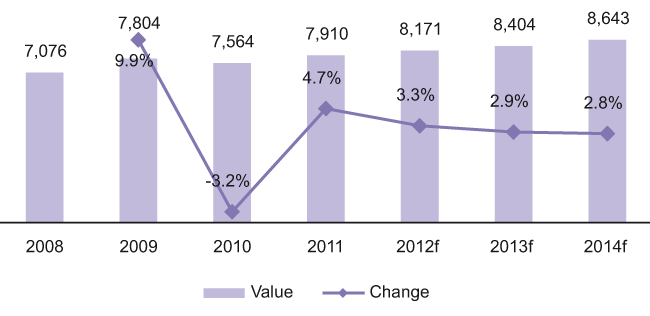Poland OTC Market Reached PLN 7.9 Billion in 2011, Informs PMR
18 Oct 2012 • by Natalie Aster

The OTC market in Poland is expected to grow at the average annual rate of some 3% in 2012-2014. Although the market will not expand as rapidly as it did in 2011, the OTC segment is poised to record positive growth, unlike the sales of reimbursed drugs. However, the Reimbursement Act, which came into force in 2012, will have implications on the OTC sector, as suggests the latest report of PMR, a research and consulting company, which is entitled “OTC market in Poland 2012”.
Report Details:
OTC market in Poland 2012
Published: August, 2012
Pages: 195
Price: US$ 2.660,00
Back on growth track in 2011
In 2011, the value of the Polish OTC market (defined as pharmacy and non-pharmacy sales of drugs and dietary supplements) increased 5% year on year and stood at PLN 7.9bn (€1.9bn). After the 3% decline recorded in 2010, which was a poor year for the pharmaceutical sector in general, the market’s value thus exceeded the level recorded in 2009. “Growth factors prevailing in 2011 included price increases, launches of new products, the aging of the population as well as increased interest in self-medication, healthy lifestyle and healthy appearance and a high incidence of flu (twice as large as in 2010)” says Agnieszka Skonieczna, PMR Senior Pharmaceutical Market Analyst and the report coordinator.
The OTC market’s growth will continue to be positive in 2012-2014 and, based on PMR forecasts, the market will grow at the annual rate of some 3%. In comparison to 2011, the 2012 decline in growth rate will be observed across all the segments of the OTC market. Some of the reasons behind it will include a high base of comparison last year and a downturn in the macroeconomic situation.
Value (PLN M) and Y-O-Y Change in the OTC Product Market in Poland, 2008-2014

Reimbursement Act will affect the OTC segment
The Reimbursement Act came into force on January 1, 2012, introducing the most significant change in the operation of the Polish reimbursement system that occurred in the recent years. Its effects are felt equally by patients, pharmacists, doctors, wholesalers and pharmaceutical companies. The Act also impacts the segment of OTC products in Poland. First of all, the Act introduced the ban on advertising pharmacies and pharmacy points and their operations (announcement of the location and working hours of a pharmacy or a pharmacy point is not considered advertising). Furthermore, the Act set a ban on advertising non-pharmacy outlets and their activities involving medicinal products or medical devices.
It is worth noting that the advertising of medications and pharmacies are independent activities which is why the Reimbursement Act did not introduces changes for medications. The ban on advertising of pharmacies does not carry with it a ban on advertising of OTC medications within pharmacies and at the same time, the advertising of a medication that is directed towards the public cannot be an advert for a given pharmacy. A pharmacy cannot advertise itself through a product, e.g. publicise the fact that in a given pharmacy a particular medications are available at a promotional price.
The Reimbursement Act also indirectly affects the OTC segment. Its consequences include increased margins on OTC products (after fixed mark-ups and prices for reimbursed drugs have been introduced, pharmacists are keen to make up for losses they suffered) and reduced stock levels of prescription drugs to the advantage of OTC products. In general, pharmacies will tend to modify their business profile and develop the OTC line of business at the expense of sales of Rx. More and more manufacturers place OTC items in their product portfolios so as to mitigate losses caused by reimbursed drugs.
OTC companies invest in production facilities
A good many of OTC companies have started or intend to start investment projects concerning production operations. Oleofarm, a Polish manufacturer of dietary supplements, will start production at a new plant on the outskirts of Wroclaw in the Walbrzych Special Economic Zone. Polfa Lodz, a manufacturer of OTC drugs and dietary supplements, launched the construction of a new plant in the Lodz Special Economic Zone in March 2011. Valued at PLN 44m (around €11m), the project is due for completion in Q3 2012.
Laboratoria Natury intends to construct a production facility in the Lublin subzone of the Euro-Park Mielec Special Economic Zone. The initial cost of the plant was estimated to be PLN 8m (€2m) but after an investor was found (Israeli company Maabarot), the investment was increased to PLN 16m or €8m (Maabarot will produce some of its own products in Poland). Construction is due to be completed in 2015.
More information can be found in the report “OTC market in Poland 2012” by PMR.
To order the report or ask for sample pages contact [email protected]
Contacts
MarketPublishers, Ltd.
Tanya Rezler
Tel: +357 96 030922
Fax: +44 207 900 3970
[email protected]
MarketPublishers.com
Analytics & News
